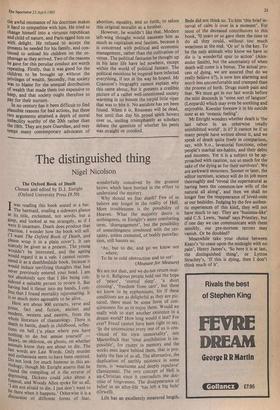The distinguished thing
Nigel Nicolson
The Oxford Book of Death Chosen and edited by D.J. Enright (Oxford University Press £9.50)
Iwas reading this book seated at a bar. The barmaid, stealing a sideways glance at its title, exclaimed, not words, but a gasp, and looked at me strangely, as if I Were It incarnate. Death does produce that reaction. I wonder how the book will sell. CI want The Oxford Book of Death, and Please wrap it in a plain cover'). It can scarcely be given as a present. The young wouldn't be interested, and the ageing would regard it as a vale. I cannot recom- mend it as a deathbedside book, because it would induce terrifying thoughts that had never previously entered your head. I am not absolutely sure that I like being con- sidered a suitable person to review it. But having had it thrust into my hands, I con- fess that I found mortality rejuvenating. It Is so much more agreeable to be alive. Here are about 900 extracts, verse and Prose, fact and fiction, ancient and modern, western and eastern, from the Whole literature of thanatology. There is death in battle, death in childhood, reflec- tions on hell ('a place where you have nothing to do but amuse yourself — Shaw), on oblivion, on ghosts, on whether a_ nunals know they are about to die. The last words are Last Words. Only murder and euthanasia seem to have been omitted. Do not look for much humour in this an- thology, though Mr Enright asserts that he found the compiling of it the reverse of depressing. Dickens could joke about a `funeral, and Woody Allen spoke for us all, _I am not afraid to die. I just don't want to be there when it happens.' Otherwise it is a discussion of different forms of fear,
wonderfully conceived by the greatest brows which have beetled in the effort to understand the mystery.
Why should we fear death? Few of us believe any longer in the reality of Hell. More troublesome is the possibility of Heaven. What the majority desire is nothingness, or Enright's more comforting term, 'disengagement', but the possibility of somethingness combined with the cer- tainty, unless cremated, of bodily putrefac- tion, still haunts us.
'Ay, but to die, and go we know not where, To lie in cold obstruction and to rot'
(Measure for Measure)
We are not dust, and we do not return neat- ly to it. Religious people hold out the hope of 'peace', 'eternal sleep', 'a short crossing', 'freedom from care', but these we know to be euphemisms, for if these conditions are as delightful as they are pic- tured, there must be some form of con- sciousness for us to enjoy them. Would we really wish to start another existence in a dream world? How long would it last? For ever? Freud cannot have been right to say, 'In the unconscious every one of us is con- vinced of his own immortality', nor Maeterlinck that 'total annihilation is im- possible', for except in memory and the works men leave behind them, that is pro- bably the fate of us all. The alternative, the duplication of earthly existence in some form, is 'wearisome and deeply repulsive' (Santayana). The very concept of Hell is un-Christian since it contradicts the doc- trine of forgiveness. The disappearance of belief in an after-life 'has left a big hole' (Orwell).
Life has an excellently measured length. Bede did not think so. To him 'this brief in- terval of calm is over in a moment'. For most of the deceased contributors to this book, 70 years or so gave them the time to do all they could, without too much weariness at the end. 'Or so' is the key. To be the only animals who know we have to die is 'a wonderful spur to action' (Alex- ander Smith), but the uncertainty of when death will come is a bonus. The actual pro- cess of dying, we are assured (but do we really believe it?), is now less alarming and much less uncomfortable and cramped than the process of birth. Drugs numb pain and fear. We must get in our last words before the mist descends in 'some sort of languor' (Leopardi) which may even be soothing and enjoyable. Koestler foresaw it in his suicide note as an 'oceanic feeling'.
Mr Enright wonders whether death is 'the last taboo in an otherwise totally uninhibited world'. Is it? It cannot be if so many people have written about it, and we speak of death quite freely in comparison, say, with b.o., lavatorial functions, other people's marital sex-habits, and their debts and incomes. Yet it is a subject to be ap- proached with caution, not so much for the sake of the dying as for their survivors'. We are awkward mourners. Sooner or later, the editor surmises, science will do its job more thoroughly and 'reveal the supernatural as having been the common-law wife of the natural all along', and then we shall no longer fear the reappearance of loved-ones at our bedsides. Judging by the few authen- tic experiences of this kind, they will not have much to say. They are 'business-like' said C.S. Lewis, 'banal' says Priestley, but if one day we can communicate with them sensibly, our pre-mortem terrors may vanish. Or be doubled?
Meanwhile take your choice between Keats's `to cease upon the midnight with no pain', Henry James's, `So here it is at last, the distinguished thing', or Lytton Strachey's, 'If this is dying, then I don't think much of it'.










































 Previous page
Previous page